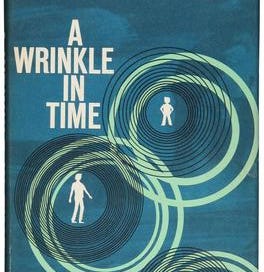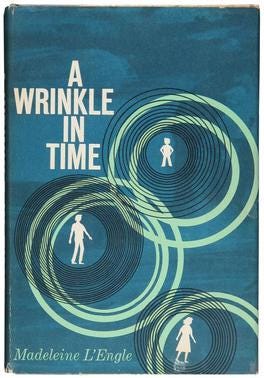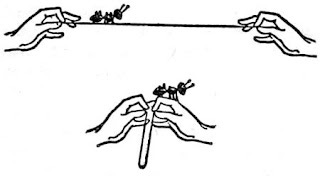More thanks to those who have subscribed! Today remains your lucky day to do so for the steep price of “free”:
Have you ever reread a book, years after first taking it in, and felt completely let down by the experience? Let me tell you a story.
When I was in third grade (maybe fourth), our teacher would reserve 30 minutes or so each day, switch off the buzzing fluorescent lights, and read to us. Once the lights went down, it was a moment of transport—we traveled somewhere else. This is nearly the only thing I remember of my years in Buffalo’s “School #54” on Main Street. To further indict my memory, the only book I remember being read, because it took over my life from its first word, is Madeleine L’Engles’ A Wrinkle in Time.
I remember staring intently at the cover while the teacher read, fascinating in its own right—three figures standing inside a series of circles that somehow represented time and its rippling mysteries (The cover is Ellen Raskin’s work, who wrote The Westing Game). The cover felt as alive and mysterious as the story.
When my children were younger, I read to them nightly, and I wanted them to have this same experience. I combed through the AbeBooks website looking for the same cover and edition that had so fascinated me. I found an old library edition and immediately ordered. I promised my children big things, that this was my favorite book and had changed my life.
Then a funny thing happened. I read them the book and, frankly, did not enjoy it. I am unsure of what our shared language is for this experience, maybe that it “doesn’t hold up,” a phrase that itself confuses me. Does this mean the book is a building that now stands in disrepair or ruin? Or maybe the story, unanchored, was blown tumbling across the road by the winds of time? In the moment, I remember being extremely disappointed by this “let down”—that somehow I had brought this imperfect thing into my children’s room, the same room where they had hung tightly onto each word of the Harry Potter series.
I was sad because maybe I didn’t love this book as much as I had thought. My past wasn’t my present. Were me and A Wrinkle in Time breaking up? If so, it must be because, of course, I’m so much more mature and wise to the ways of the world. I should have been prepared for this, as I had heard many people make the same claim about The Catcher in the Rye (“Now that I’m older, I don’t like Holden. He’s annoying. I sympathize with the adults.”) Then the A Wrinkle in Time film was released (starring Oprah Winfrey) which was widely panned, and thus things just got worse.
But then…a revelation. How greedy I was to want something to be perfect forever. How short-sighted I was to believe my feelings in the present negated my emotions in the past. I had forgotten the book’s title and its meaning. I often say to students, especially when they “don’t like” something, that “books are like people; sometimes you just meet them at the right or wrong time.” I use Moby Dick as an example—a book I failed to finish three times and absolutely hated. But the fourth time was absolutely the right time, and now I treasure Melville’s novel. I had met A Wrinkle in Time at the perfect moment in my life, as all I wanted from that moment onward was more like it—more reading, more adventure, more books. Now, I am a Professor of Literature, Humanities, and Writing. I can trace this fortunate present back to that past using the very diagram A Wrinkle in Time uses to explain the concept of time’s wrinkle:
Now, I love the novel even more. I love it for what it was when I encountered it and what it did for me. In fact, this is now actually my dream as a writer—I want to write a work that people love at one time…but then don’t anymore. This feels more difficult than writing a canonical work whose reputation outlasts Ozymandias’s statue—to write something that grabs and means something to readers at the right moment, but not forever, to stick the landing, but just briefly. You know, sort of like most human relationships. It is perfectly fine for a book to be like “a person you used to know.” There are countless people that we used to know, and it’s good to pause and remember and have love for those who were the right people at the right time. It should be a national holiday.
So now I love A Wrinkle in Time for what it was, and thus it has become, again, what it is. It is unique to me in this way in my life as a reader: as the concentric circles on Raskin’s cover design pushed me further away from the epicenter I finally found the wrinkle, the realization that brings me across time and teaches me to avoid what I find to be a misguided, unimaginative mindset—that your feelings in the present are a linear evolution and better version of the past. They’re not. They’re just now. And sometimes, maybe even quite often, then was pretty great too.
If you’re so inclined, I would love to know what book(s) you have similar feelings about.






I've finished "The Dispossessed" and while it's not my favorite LeGuin, it wasn't really disappointing, either. I'm intrigued by your strategy of putting down books that don't compel you to keep reading them. I probably need to incorporate that into my reading regimen. But it is so hard. For so long I've made it a point of pride to finish any book I started, with only a couple of exceptions (e.g., a biography of Kant, which . . . well, what was I thinking?). To not finish what I've started? Almost inconceivable. I'll let you know what happens with "A Wrinkle in Time."
Such a good post, D.A.! I had this same encounter with WRINKLE when I re-read it as a college student for a Children's Lit class and found it insufferable. At that time of my re-reading, I was still a teen, just a few years older than my first reading. What was going on?! I felt a void, like a literal void, between the enchantment of my first reading and the disappointment of my re-reading. I rushed to fill that void with analysis, mainly because it was better than sitting with this new kind of grief that I'm sure can be named in the German language. So I really like your conclusions: all times in our lives, all nows, are the right times, the right nows. And to use my line of thinking, maybe we are *supposed* to have those uncomfortable new voids between then and now-- and not mark them as "growth," but simply as "a new or different experience." Like, and here's a leap, the Grand Canyon. I'm sure it looked amazing eons ago as a fully intact, tree- or dinosaur -filled piece of flat land. Now, the chasm time has carved is all we know of that land, and it is awe-inspiring. But we'd never point at that gorgeous chasm and call it a void. We don't mourn the loss of something once whole and flat. It just IS, and we're pleased to engage it in the here and now.
Whoa, this got DEEP. Thanks for letting me think out loud here. Great post.